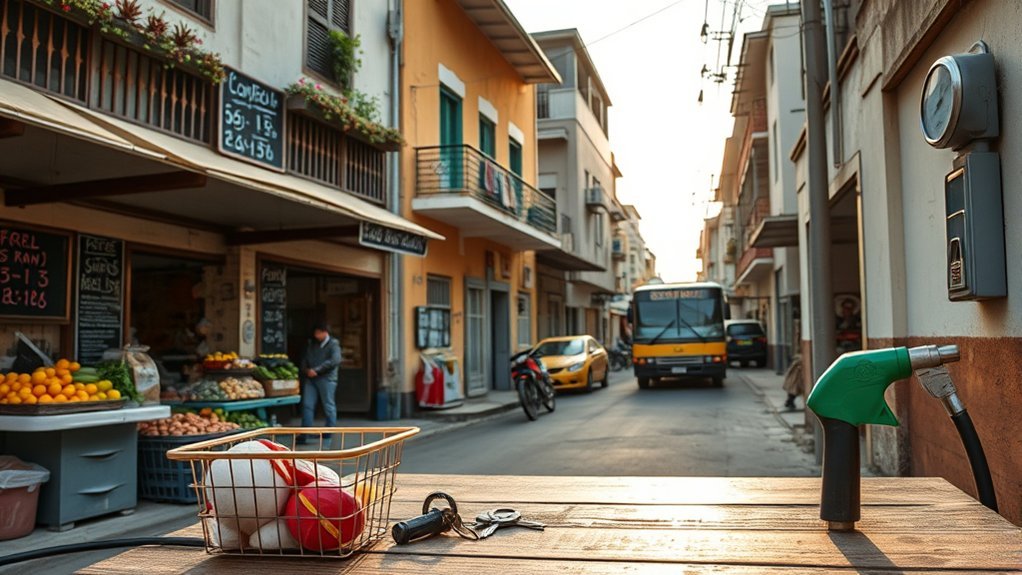You can live modestly in Honduras for about $300–$750 a month (excluding rent) or comfortably for $600–$1,500 depending on city, housing and lifestyle. Expect city-center one-bedroom rents near $306, utilities around $59, 50 Mbps internet about $40, and casual meals for $6–$7. Public transport is cheap and groceries run $100–$250 monthly. Healthcare and private insurance add costs, but overall it’s cheaper than many countries — keep going to see detailed budget breakdowns and tips.
Overview of Living Costs in Honduras
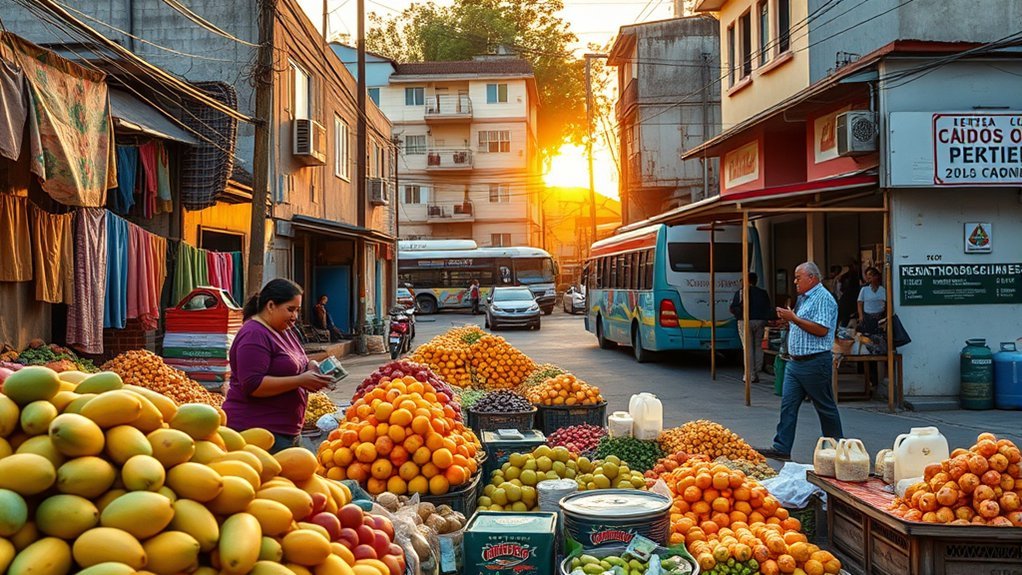
Although living costs vary by city and lifestyle, Honduras is generally affordable: the average monthly cost runs about $835, roughly 1.37 times cheaper than the world average.
You’ll find living expenses that favor basic needs—rent, utilities, food and transport—so your money stretches further than in many countries. For cost of living comparisons, a one-bedroom in the city center averages $306, while outside center it’s about $229, letting you choose location versus savings.
Utilities for one person run near $59.3 monthly, and reliable 50 Mbps internet costs about $39.6, so remote work is workable.
Eating out stays affordable: a casual lunch is ~$6.48 and a dinner for two about $29.
Local transport is cheap—a single ticket is $0.97 and a monthly pass $31.3—useful if you’ll explore areas like West End without raising your baseline expenses.
These figures help you plan practical, comparative choices.
Monthly Budget Breakdown by Lifestyle
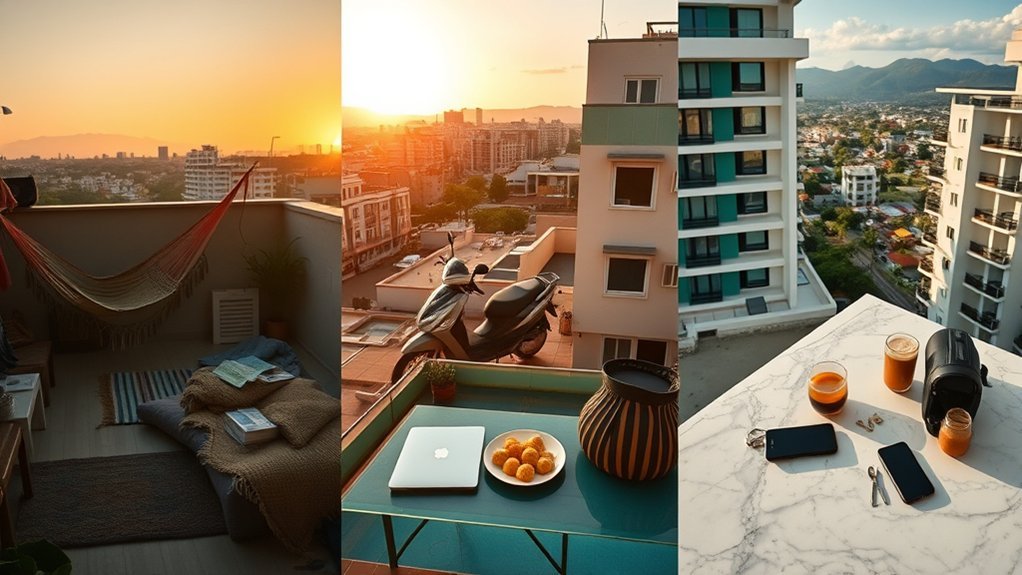
If you live frugally in Honduras, you can keep monthly non-rent costs near the low end of $300 by cooking at home, using local transport, and limiting dining out.
A comfortable budget pushes you toward the $600–$750 range, which covers more restaurant meals, utilities, and occasional extras while still excluding rent.
Compare these to the average after-tax salary of $549 to see how far each lifestyle stretches your income.
Frugal Monthly Costs
A frugal expat in Honduras can live on roughly $300–$750 a month (excluding rent), depending on how often you eat out and drink, with groceries like milk at $1.41/L and a dozen eggs around $2.17 helping keep food costs low. You can follow a frugal lifestyle by prioritizing groceries, using local transport, and choosing affordable dining options. Compare costs: lunch menus average $6.48, while dinner for two is about $29. Monthly transport passes run $31.3; single tickets cost $0.97. The average net salary is ~$549, so you’ll want to plan monthly expenses carefully.
| Category | Typical Cost |
|---|---|
| Groceries | $100–$250 |
| Transport | $10–$40 |
| Eating out | $20–$120 |
| Misc/Utilities | $50–$200 |
Comfortable Monthly Budget
Many expats find that budgeting $1,500–$3,000 a month on Roatán gives you a comfortable lifestyle, with the lower end covering modest comforts and the higher end allowing for nicer housing, regular dining out, and extras like island activities.
If you aim for a comfortable monthly budget, expect rent to take a notable share: a one-bedroom in town averages around $306, though cheaper options start near $229.
Monthly living costs excluding rent typically run $300–$750, with dining expenses driving the higher end—lunches near $6.50 and dinners for two about $29.
Compare your priorities: choose pricier rent and fewer outings, or save on housing and allocate more for restaurants and leisure to match your lifestyle.
Housing and Rental Market Across Regions
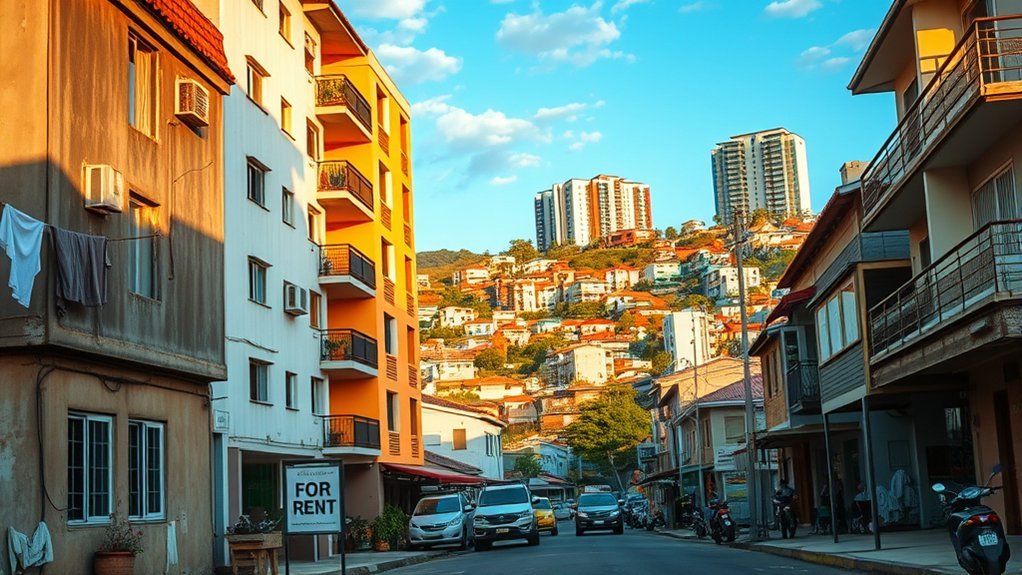
Although prices vary by region and lifestyle, you’ll find that city-center one-bedroom rentals average about $306 while cheaper options outside downtown run near $229, and three-bedroom city-center units for families go for roughly $602.
You’ll notice clear differences between mainland cities and island locations when comparing housing and rental choices for daily living.
- Roatán: long-term rental floors around $600; beachfront condos commonly $1,000–$1,500, still cheaper than many Caribbean alternatives.
- Mainland cities: modest one-bedrooms and family-sized three-bedrooms keep monthly housing costs lower, helping total living budgets stay toward the $1,500 end if you choose frugal options.
- Property buyers: beachfront lots under $100,000 make ownership attractive if you plan long-term and want to reduce recurring rental expense.
Compare neighborhoods for safety, utilities, and commute; those factors shift effective rental value more than headline prices alone.
Food, Groceries and Dining Prices

You’ll find typical lunches run about $6.50 and dinner for two around $29, with fast food near $7.60—so eating out can be cheaper than in many U.S. cities.
Grocery staples are inexpensive (milk $1.41/L, a dozen eggs $2.17), which helps if you cook at home.
Look for local comedores for the best value and reserve upscale restaurants for special occasions.
Typical Meal Prices
Expect everyday meals in Honduras to be very budget-friendly compared with many countries: a typical lunch runs about $6.48, a fast-food combo is roughly $7.57, and dinner for two at a mid-range restaurant averages near $29.
You’ll find simple local eateries and casual restaurants that stretch your dining budget without sacrificing flavor. The cost of a beer (0.5L) in a pub is about $1.42, making social outings inexpensive.
- Typical lunch menu: expect home-style plates with rice, beans, protein and drink for around $6–7, cheaper than Western casual dining.
- Fast food: a McDonald’s-style combo at $7.57 suits quick, predictable meals.
- Dinner for two: $29 buys a comfortable evening at a mid-range spot.
Grocery Staples Cost
Grocery shopping in Honduras is generally affordable, with staples like a liter of milk around $1.41 and a dozen eggs about $2.17, so you can keep basic food costs low compared with many places.
You’ll find grocery staples like rice, beans and local produce at low prices in neighborhood markets and the West End supermarket, where affordable groceries are common.
For broader selection or imported items, head to Coxen Hole—it’s a short $3 taxi ride to larger supermarkets that carry brands you might expect.
Compare unit prices and buy seasonal produce to stretch your budget. Expect to pay more for convenience items and imported goods; planning meals around local staples keeps your monthly food bill predictable and considerably lower than frequent dining out.
Eating Out Tips
If you prefer eating out occasionally rather than cooking every night, Honduras keeps dining affordable compared with many countries: breakfast runs $3–$5, lunches around $5–$10 (with many set lunch menus near $6.48), and dinner typically costs $7–$20 per person or about $29 for a mid-range meal for two.
You’ll find fast food around $7.57, beers at $1.42, and cappuccinos near $2.35. Use restaurants and beach bars to control costs.
- Seek local fondas and set menus — one of the best values for lunch near markets and Half Moon tourist spots.
- Compare prices: a mid-range dinner can equal several cheap lunches, so plan evenings selectively.
- Buy basics at supermarkets (milk $1.41, dozen eggs $2.17) to mix dining out with cooking.
Transportation, Utilities and Internet Costs
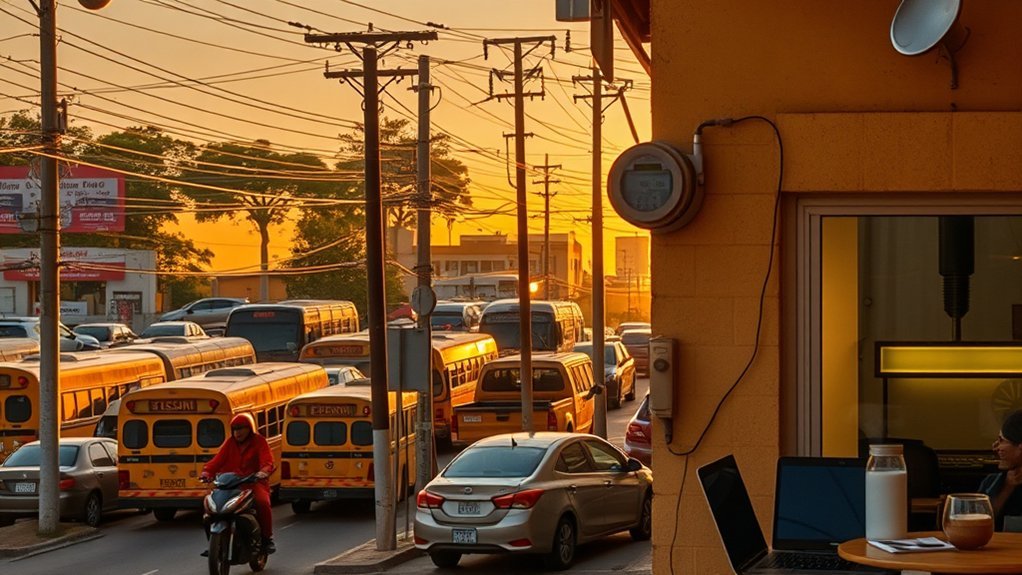
Several everyday transport and utility costs in Honduras stay well below what you might pay in many countries: a single local bus ticket runs about $0.97 while a monthly pass is roughly $31.30, gasoline is around $1.08 per liter, utilities for one person average $59.30 monthly, and internet plans (50 Mbps+) cost about $39.60.
You’ll find public transport options are plentiful in cities, so buying a monthly pass usually beats paying per ride if your commuting habits include daily trips. If you drive, low fuel prices help, but apply fuel efficiency tips—maintain tire pressure, avoid heavy idling, and combine errands—to keep costs down.
Utilities cover electricity and water and will vary with air-conditioning use; budget around $60 but expect spikes in hot months. Internet at about $40 gives reliable 50 Mbps+ service, suitable for remote work and streaming.
Healthcare, Insurance and Safety Nets

While Honduras’ healthcare costs are generally lower than in many countries, you’ll want to plan carefully for quality and emergency needs: a typical doctor visit runs about $30 and basic local insurance plans can start near $50 per month, but private coverage is recommended for faster service and better facilities in cities like Tegucigalpa and San Pedro Sula.
You’ll find decent healthcare accessibility in larger cities, where private hospitals offer modern equipment and prompt emergency services, while rural areas rely more on limited public clinics.
- Compare insurance options: local plans are affordable, but private or international policies give broader networks and quicker access in urban centers.
- Budget for gaps: basic plans may not cover specialist care, procedures, or evacuation—factor additional premiums or riders.
- Emergency services readiness: major hospitals handle acute cases well, yet evacuation costs can be high, so verify coverage limits and transfer clauses.
Tips for Expats and Long‑Term Visitors
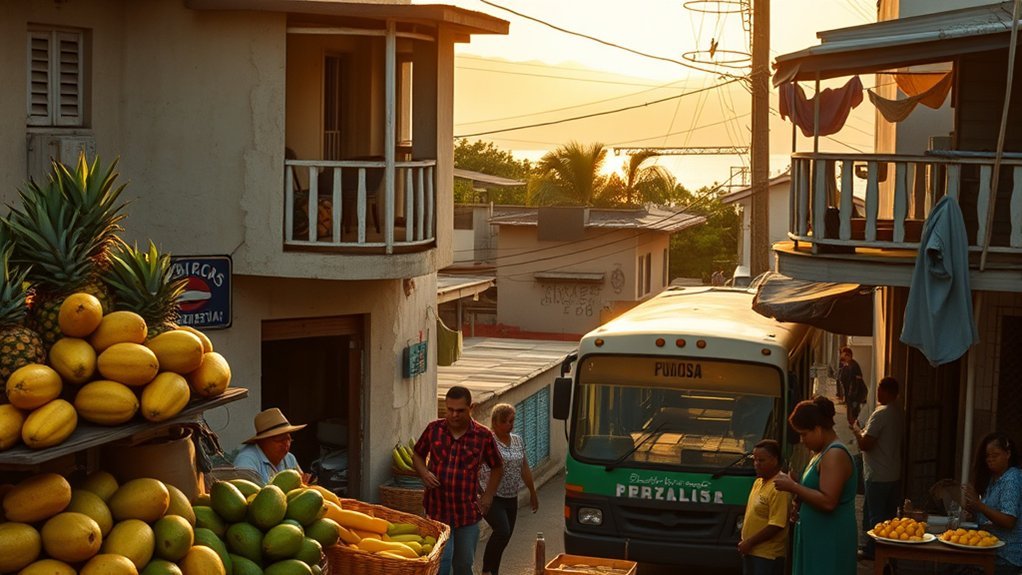
After you’ve figured out healthcare and insurance, it helps to get a clear picture of everyday costs so you can plan your budget and lifestyle in Honduras. Expect monthly expenses between $1,500 and $3,000 depending on location and choices.
After you sort healthcare and insurance, map out everyday costs — expect $1,500–$3,000 monthly.
Compare rentals — a city-center one-bedroom averages $306, with cheaper options from $229 — to decide whether to prioritize housing or dining. Meals are affordable (lunch ~$6.48; dinner for two ~$29), and transport is cheap (single ticket $0.97; monthly pass ~$31.30), so factor daily mobility into your budget.
For smoother cultural adjustments and social integration, learn basic Spanish to reduce language barriers and show respect. Use local markets and restaurants to meet people; join expat groups to compare prices and services.
Set up a PayPal account because many places won’t accept cards. Track recurring costs, revisit your budget after the first month, and adjust housing or lifestyle choices to stay within your target range.
Frequently Asked Questions
How Much Money to Live Comfortably in Honduras?
You’ll need about $1,500–$3,000 monthly to live comfortably in Honduras; that reflects cost of living and monthly expenses. Budgeting tips: compare locations, prioritize rent, track spending, and add local income or savings for safety.
Can a US Citizen Live in Honduras?
Yes — you can live in Honduras. You’ll follow visa requirements, join expat communities, and compare cost of healthcare to US prices; plan finances, prove income, and pick coastal hubs for lower expenses and stronger support networks.
Is Honduras a Good Place to Live?
Yes — you’ll find affordable housing and rich cultural experiences, though healthcare quality varies compared to developed countries; you’ll save money, enjoy outdoor life, but should plan carefully and compare regions for safety and services.
How Much Does a Big Mac Cost in Honduras?
Like finding a cool spring in a hot market: you’ll pay about $4.56 for a Big Mac in Honduras. You’ll use that price for price comparison, seeing fast food as a practical, affordable cost benchmark.
Conclusion
You’ll likely pay between $600–$1,500 monthly depending on lifestyle, with Tegucigalpa and San Pedro Sula at the higher end and smaller towns much cheaper — that 60–70% rent savings outside major cities is striking. Factor in utilities, transport and groceries, and you can live comfortably on about $800 in many areas. Compare neighborhoods, negotiate leases, and budget for healthcare and safety measures to stretch your money further.

